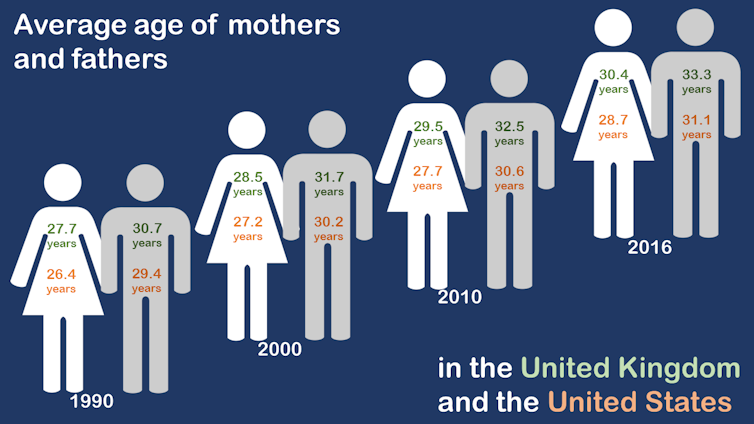
The answer will not only be different for different people but may change during your life. While fertility declines with age most healthy women are biologically able to have a baby until menopause and most healthy males are still fertile in their 60s and 70s.

Women are most fertile and have the best chance of getting pregnant in their 20s.
Whats a good age to have a baby. While fertility declines with age most healthy women are biologically able to have a baby until menopause and most healthy males are still fertile in their 60s and 70s. As people age some risks. Those who reported the best health overall in middle or old age had had their first babies on average at 30.
Those with the fewest aches and pains and the fewest chronic diseases had had them on average at 34. Put it all together he said and the optimum age at first birth in terms of the mothers long-term physical well-being was 31 years old. Women are most fertile and have the best chance of getting pregnant in their 20s.
This is the time when you have the highest number of good quality eggs available and your pregnancy risks are. The best age to have a baby according to ob-gyns. Your twenties may be the best age for you to have a baby.
According to all of the epidemiological data we have there is a sort of sweet spot between your early 20s and age 34 notes Eastabrook who is also an assistant professor at the Schulich School of Medicine Dentistry at Western University. The problems with waiting till after 35 to have a baby. Although one in seven couples has trouble conceiving and age is a big player in this.
One in six women aged between 35 and 39 years of age will not conceive after one year. If their partner is. It can strike at any age.
If youve waited until a bit later in life to try to conceive you may wonder if youre too old to have a baby. A pregnancy after age 35 automatically puts you in the. By age 40 a healthy womans chances of becoming pregnant each month are less than 5 percent.
The bigger concern within this age range however are the medical risks involved. Many obstetricians recommend waiting at least 18 months before conceiving again as best for the new babys health. The downside is this puts you smack dab in the middle of the Terrible Twos.
What Age Will You Have Your First Baby. Everybody goes through life at their own pace. Some start a family early on some choose to focus on their career first.
According to a study by the University of Southern California scientists now believe that the best time to have a baby and give birth is after the age of 35 as it improves the mental abilities. Whats the best age to have a baby. Its a question just about every person considers once they enter adulthood.
The answer will not only be different for different people but may change during your life. It may be that in your twenties having kids later felt right but once you got to your mid-30s never feels more acceptable. Those who reported the best health overall in middle or old age had had their first babies on average at 30.
Those with the fewest aches and pains and the fewest chronic diseases had had them on. The answer is somewhere between 30 35 for focused couples. Combine the biological factors found in the first part of this post and the age range of 30 35 seems like the best age to have a baby.
In fact the best age to have a baby will differ from person to person. Biologically you are most fertile in your 20s and 30s and it will be much harder to have babies at 40 or older. But you also need to be emotionally mentally and financially prepared to take on the challenge of becoming a parent.
The late twenties could be the best age for a woman to get pregnant as she is mature enough to have a baby. Another study published in the Journal Human Reproduction found that women in their late 30s have 50 per cent lower chance of getting pregnant even during their most fertile days as compared to women who are in their early 20s. Those who reported the best health overall in middle or old age had had their first babies on average at 30.
Those with the fewest aches and pains and the fewest chronic diseases had had them on. For the first 4 to 6 months breast milk or formula is the only food your baby needs. After that you can start solid foods when your baby show signs of readiness.
At first your little one will keep it simple with just a few teaspoons of a one-ingredient food like a.